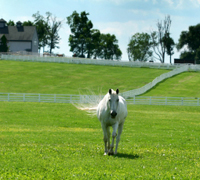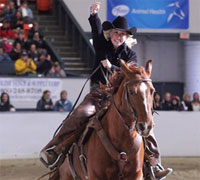 Every day grazing is money saved, according to Ray Smith, University of Kentucky forage extension specialist.
Every day grazing is money saved, according to Ray Smith, University of Kentucky forage extension specialist.
Optimal use of horse pastures has always been an important component of horse farm management, but with horse owners worried about the current economic downturn and the costs associated with feeding their horses, maximizing pastures has become paramount. Add back-to-back summers with damaging drought conditions, and consulting with forage experts might be one of the best investments a horse farm can make.
“For 2009, the University of Kentucky Horse Pasture Evaluation Program is adding an emphasis on how to maximize the economic benefits of pasture versus feeding hay, and how well-maintained pastures can reduce your overall feeding cost,” said Smith. “Consider that the cost of grazing is one-third to one-half the cost of feeding hay. We know that every dollar counts and will help farms focus on saving money by maintaining productive pastures.”
Now in its fifth year, the program, which is housed in the College of Agriculture’s Department of Plant and Soil Sciences, has conducted approximately 70 evaluations for area horse farms and analyzed more than 11,000 acres of horse pastures. It runs April through October each year.
The program’s two main objectives are to provide detailed pasture management recommendations to horse farm owners and managers and to evaluate tall fescue within pastures and determine its potential to cause fescue toxicity in pregnant broodmares.
The assessment provided by the program includes soil type and soil productivity, types and ratios of grasses and weeds present in each pasture, an estimation of forage available, and a laboratory evaluation of endophyte, a fungus commonly found in tall fescue, and associated levels of ergovaline, a compound toxic to pregnant mares.
Enhancements for this year include increased acreage (up to an entire farm if requested), an opportunity to enroll in a pilot study measuring ascarid egg contamination in pastures and follow-up measurements of ergovaline throughout the year.
Visit www.uky.edu/Ag/Forage/HorseLinks.htm for the enrollment form and additional information about the program.
Find out more information on pasture management.





very good idea.
Sounds good.